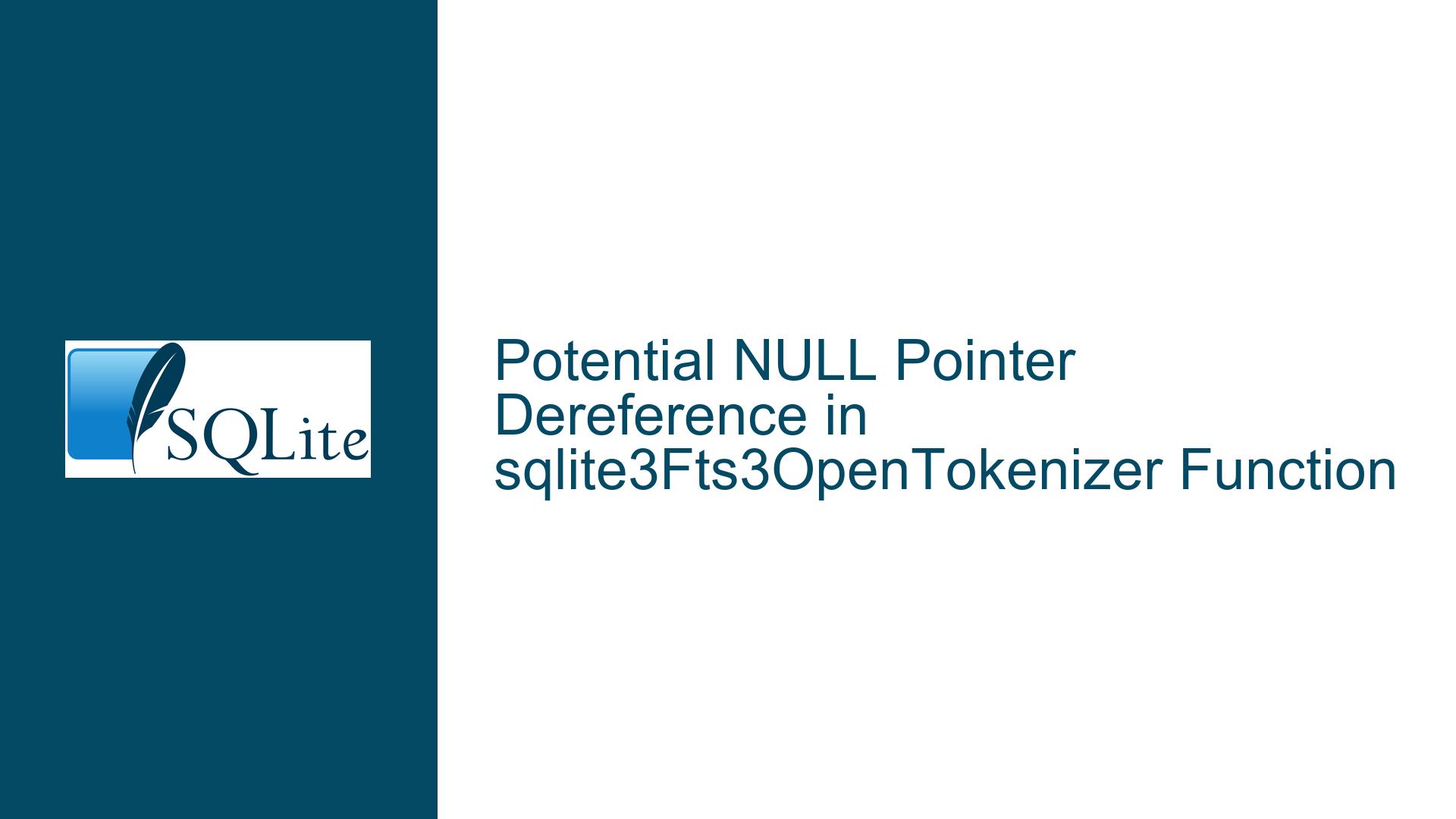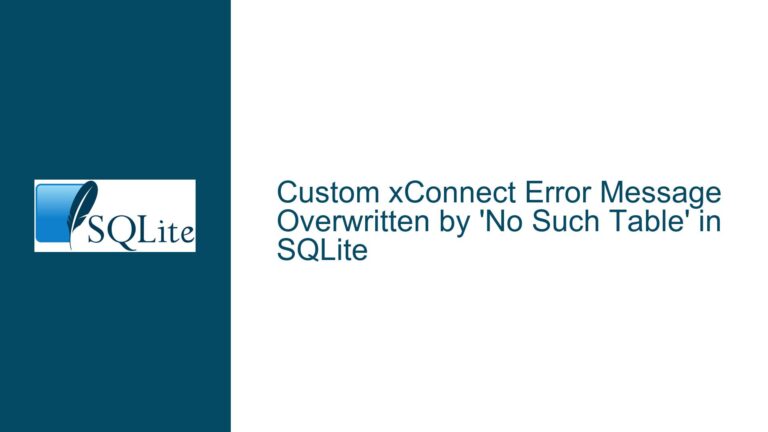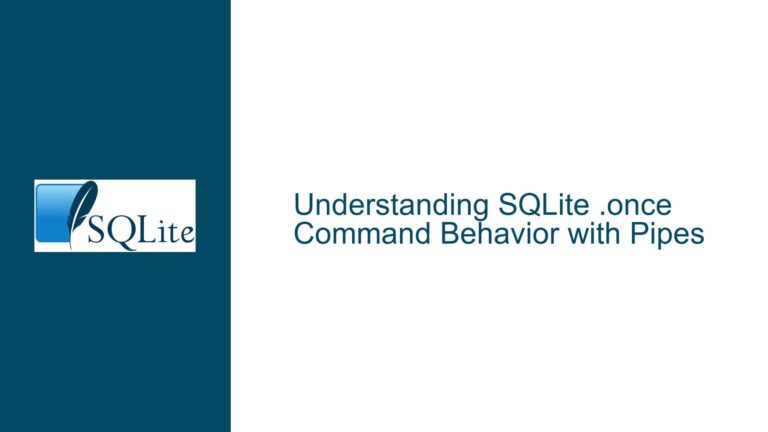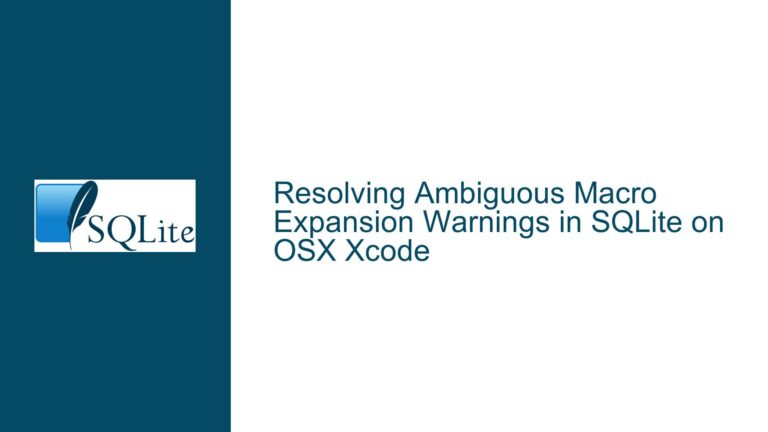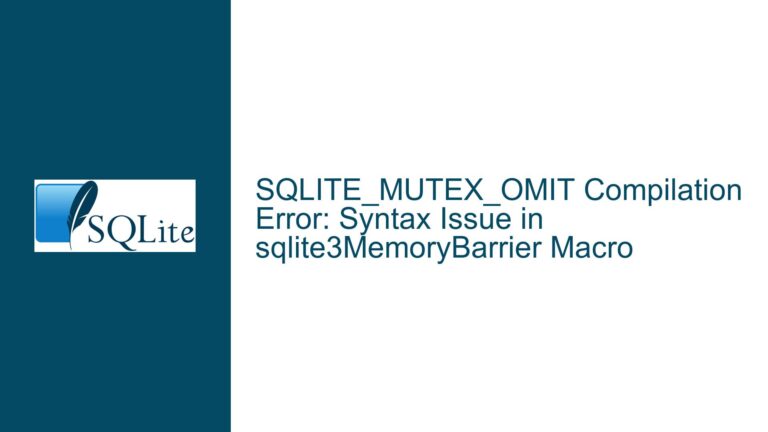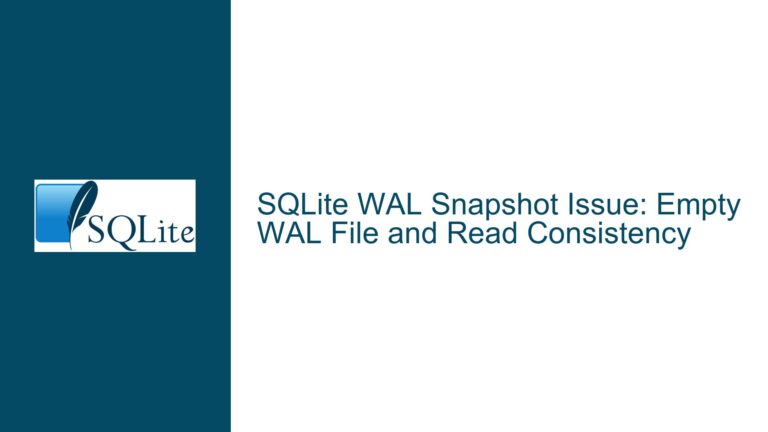Potential NULL Pointer Dereference in sqlite3Fts3OpenTokenizer Function
Dereference Failure: NULL Pointer in sqlite3Fts3OpenTokenizer
Issue Overview
The core issue revolves around a potential NULL pointer dereference in the sqlite3Fts3OpenTokenizer function within the SQLite codebase, specifically in the ext/fts3/fts3_expr.c file. This function is part of SQLite’s Full-Text Search (FTS3) module, which is responsible for tokenizing text data for indexing and searching purposes. The function sqlite3Fts3OpenTokenizer is designed to open a tokenizer cursor, which is used to iterate over tokens in a given input string. The function takes several parameters, including a pointer to a sqlite3_tokenizer structure, a language ID, the input string, its length, and a pointer to a tokenizer cursor.
The problematic line of code is located at line 145 of fts3_expr.c, where the function attempts to dereference the pCsr pointer to set its pTokenizer field. The issue arises because the function does not explicitly check whether the pCsr pointer is NULL before dereferencing it. While there is an assertion that ensures pCsr is NULL if the return code rc is not SQLITE_OK, this assertion alone is insufficient to guarantee safety. The function also does not verify that the function pointers within the pModule structure (such as xOpen, xLanguageid, and xClose) are non-NULL before invoking them. This oversight could lead to a NULL pointer dereference if any of these function pointers are NULL, resulting in undefined behavior, crashes, or potential security vulnerabilities.
The issue was identified using a tool called LSVerifier, which is designed to detect code property violations, including NULL pointer dereferences. The tool generated a counterexample that demonstrates the violation, specifically highlighting the dereference of pCsr at line 145. The counterexample indicates that the property "dereference failure: NULL pointer" is violated, meaning that the code could potentially dereference a NULL pointer under certain conditions.
Possible Causes
The potential causes of this issue can be categorized into several areas, each of which contributes to the risk of a NULL pointer dereference in the sqlite3Fts3OpenTokenizer function.
1. Lack of Explicit NULL Checks on Function Pointers: The primary cause of the issue is the absence of explicit checks to ensure that the function pointers within the pModule structure are non-NULL before they are invoked. The pModule structure contains several function pointers, including xOpen, xLanguageid, and xClose, which are used to perform various operations on the tokenizer cursor. If any of these function pointers are NULL, invoking them would result in a NULL pointer dereference. This is particularly concerning because the pModule structure is passed into the function via the pTokenizer parameter, and there is no guarantee that the caller has properly initialized all the function pointers within pModule.
2. Insufficient Validation of Input Parameters: Another contributing factor is the lack of thorough validation of the input parameters passed to the sqlite3Fts3OpenTokenizer function. Specifically, the function does not check whether the pTokenizer parameter or its associated pModule structure is NULL before attempting to use them. If either pTokenizer or pModule is NULL, the function would attempt to dereference a NULL pointer, leading to undefined behavior. This is a common issue in C/C++ code, where the responsibility for ensuring that pointers are non-NULL often falls on the caller, but defensive programming practices suggest that functions should validate their inputs whenever possible.
3. Reliance on Assertions for Safety: The function includes an assertion that ensures pCsr is NULL if the return code rc is not SQLITE_OK. While this assertion provides some level of safety, it is not sufficient to prevent NULL pointer dereferences in all cases. Assertions are typically used for debugging purposes and are often disabled in production builds, meaning that they cannot be relied upon to prevent runtime errors. Additionally, the assertion does not cover all possible scenarios where pCsr could be NULL, such as if the xOpen function fails to allocate memory for the cursor or if the pModule structure is improperly initialized.
4. Potential Misuse of the Function by Callers: The sqlite3Fts3OpenTokenizer function is part of SQLite’s internal API, and its behavior is well-defined within the context of the SQLite codebase. However, if the function is called by external code (which should not happen, as it is not part of SQLite’s public API), there is a risk that the caller could pass invalid or improperly initialized parameters, leading to NULL pointer dereferences. This is why it is important to clearly distinguish between public and private functions in a library, as Simon Slavin pointed out in the discussion. Public functions should be designed with robust error handling and input validation, while private functions can assume that their inputs are valid, provided that they are only called by other parts of the library.
5. Tooling Limitations and False Positives: While the LSVerifier tool identified a potential NULL pointer dereference in the sqlite3Fts3OpenTokenizer function, it is important to consider the possibility of false positives. Static analysis tools like LSVerifier can sometimes generate counterexamples that do not reflect real-world usage patterns, especially in complex codebases like SQLite. In this case, the tool may have identified a theoretical issue that would not occur in practice due to the way the function is used within the SQLite codebase. However, even if the issue is a false positive, it is still worth addressing to ensure the robustness and security of the code.
Troubleshooting Steps, Solutions & Fixes
To address the potential NULL pointer dereference issue in the sqlite3Fts3OpenTokenizer function, several steps can be taken to improve the safety and reliability of the code. These steps include adding explicit NULL checks, improving input validation, and considering the broader context in which the function is used.
1. Add Explicit NULL Checks for Function Pointers: The most straightforward solution is to add explicit checks to ensure that the function pointers within the pModule structure are non-NULL before invoking them. This can be done by adding a series of conditional statements at the beginning of the function, as suggested in the discussion. For example, before calling pModule->xOpen, the function should check whether pModule->xOpen is non-NULL. Similarly, before calling pModule->xLanguageid and pModule->xClose, the function should verify that these function pointers are non-NULL. If any of these checks fail, the function should return an appropriate error code, such as SQLITE_ERROR, to indicate that the operation cannot be performed due to invalid input.
2. Validate Input Parameters: In addition to checking the function pointers within pModule, the function should also validate the pTokenizer parameter and its associated pModule structure. This can be done by adding a check at the beginning of the function to ensure that pTokenizer is non-NULL and that pTokenizer->pModule is also non-NULL. If either of these checks fails, the function should return an error code to indicate that the input parameters are invalid. This approach follows the principle of defensive programming, which emphasizes the importance of validating inputs to prevent errors and improve the robustness of the code.
3. Replace Assertions with Runtime Checks: While assertions can be useful for catching programming errors during development, they should not be relied upon to prevent runtime errors in production code. In the case of the sqlite3Fts3OpenTokenizer function, the assertion that ensures pCsr is NULL if rc is not SQLITE_OK should be replaced with a runtime check. This can be done by adding a conditional statement that checks whether pCsr is non-NULL before dereferencing it. If pCsr is NULL, the function should return an error code to indicate that the operation failed. This approach ensures that the function behaves correctly even if the assertion is disabled in a production build.
4. Document the Function’s Preconditions: To prevent misuse of the sqlite3Fts3OpenTokenizer function, it is important to clearly document its preconditions and expected behavior. This documentation should specify that the function is part of SQLite’s internal API and should not be called by external code. It should also describe the expected state of the input parameters, including the requirement that pTokenizer and pModule are non-NULL and that all function pointers within pModule are properly initialized. By documenting these preconditions, developers who work on the SQLite codebase can ensure that they use the function correctly and avoid introducing bugs or security vulnerabilities.
5. Consider the Broader Context: When addressing potential NULL pointer dereferences, it is important to consider the broader context in which the function is used. In the case of sqlite3Fts3OpenTokenizer, the function is part of SQLite’s FTS3 module, which is used for full-text search functionality. This module is designed to be highly modular and extensible, allowing developers to implement custom tokenizers by providing their own sqlite3_tokenizer and sqlite3_tokenizer_module structures. Given this design, it is possible that the pModule structure could be provided by third-party code, which increases the risk of NULL function pointers. To mitigate this risk, the FTS3 module could include additional safeguards, such as a registration mechanism that ensures all function pointers within pModule are properly initialized before the tokenizer is used.
6. Test the Fixes Thoroughly: After implementing the suggested fixes, it is important to thoroughly test the sqlite3Fts3OpenTokenizer function to ensure that it behaves correctly in all scenarios. This testing should include both unit tests and integration tests, with a focus on edge cases that could trigger NULL pointer dereferences. For example, the tests should include cases where pTokenizer or pModule is NULL, cases where one or more function pointers within pModule are NULL, and cases where the xOpen function fails to allocate memory for the cursor. By testing these scenarios, developers can verify that the function handles invalid inputs gracefully and does not dereference NULL pointers.
7. Review the Codebase for Similar Issues: Finally, it is worth reviewing the rest of the SQLite codebase for similar issues, as the problem identified in sqlite3Fts3OpenTokenizer could be indicative of a broader pattern. Specifically, developers should look for other functions that dereference pointers without first checking whether they are NULL, especially in cases where the pointers are passed in as parameters or obtained from external sources. By identifying and addressing these issues proactively, the SQLite development team can improve the overall safety and reliability of the codebase.
In conclusion, the potential NULL pointer dereference in the sqlite3Fts3OpenTokenizer function is a serious issue that could lead to crashes, undefined behavior, or security vulnerabilities. By adding explicit NULL checks, validating input parameters, replacing assertions with runtime checks, documenting preconditions, considering the broader context, testing thoroughly, and reviewing the codebase for similar issues, developers can address this issue and improve the robustness of the SQLite codebase.
